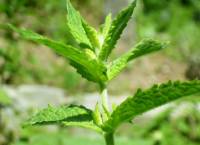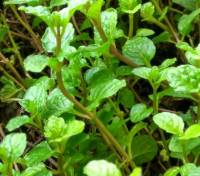Spearmint, garden mint, common mint
| Botanical Information |
| Order | Lamiales |
| Family | Lamiaceae |
| Genus | Mentha |
| Common Name | Spearmint, garden mint, common mint |
| Species | M. spicata |
Maturity days
Planting Months
| Planting months |
| Jan | Feb | Mar | Apr | May | Jun | Jul | Aug | Sep | Oct | Nov | Dec |
| | | | X | X | X | X | | | | | |
Permaculture uses
| Permaculture uses |
| Usage 1 | Usage 2 | Usage 3 |
| | Ground_cover | Herb |
| Growing Condition | Comment |
| Drought Tolerant | |
| Humidity tolerant | |
| Planting area | Garden_bed |
| Sunlight | Part_shade |
Photos
Perennial herbaceous plant. Invasive rhizomes. Leaves can be fresh, dried frozen preserved in salt sugar
Can grow with Cabbages and Tomatoes.
Although mint can be grown from seeds, cuttings are a faster, more reliable option. Cuttings can be planted directly into the ground.
Mint can be grown in pots outdoors or indoors Mint prefers damp, partly shaded areas and once established will grow for many years. Mint is a rampant grower and will take over a garden bed if not restrained. If grown in a pot, mint needs to be watered regularly to keep it healthy. Culinary hints - cooking and eating Mint Mint adds a fresh flavour if chopped and sprinkled over salads. And is traditionally used mixed with vinegar and sugar to make mint sauce for lamb.
Mint is best grown towards the bottom shady portion of the Herb Spiral.

